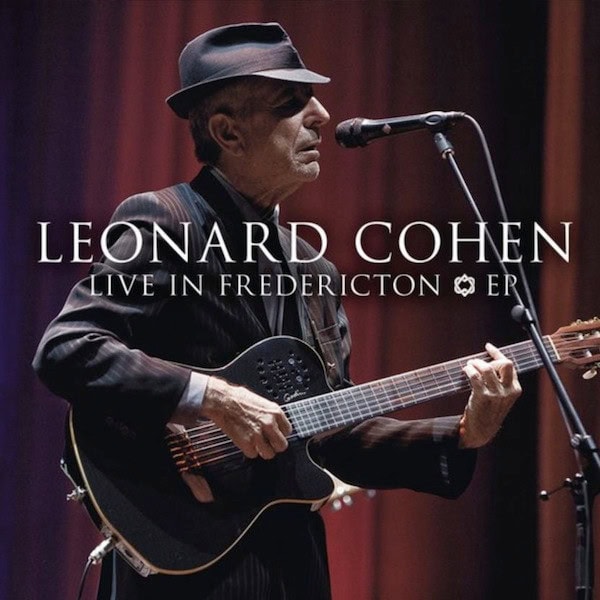It was May 11, 2008 — a Sunday and Mother’s Day. The Fredericton Playhouse, the main performing arts venue in New Brunswick’s capital city, was sold out that night. People from around the world had been desperately trying to get one of the 709 seats available for this show for weeks, but they were all snapped up minutes after they went on sale.
The reason for the excitement was that, of all the great cities and beautiful theatres in the world, the Fredericton Playhouse had been chosen as the very first venue for the return of Leonard Cohen to the concert stage. It had been 15 years since Cohen retired from performing, and he thought he was done with big tours. But a twist of fate brought him back.
Tim Yerxa, the Executive Director of the Playhouse, found Cohen backstage.
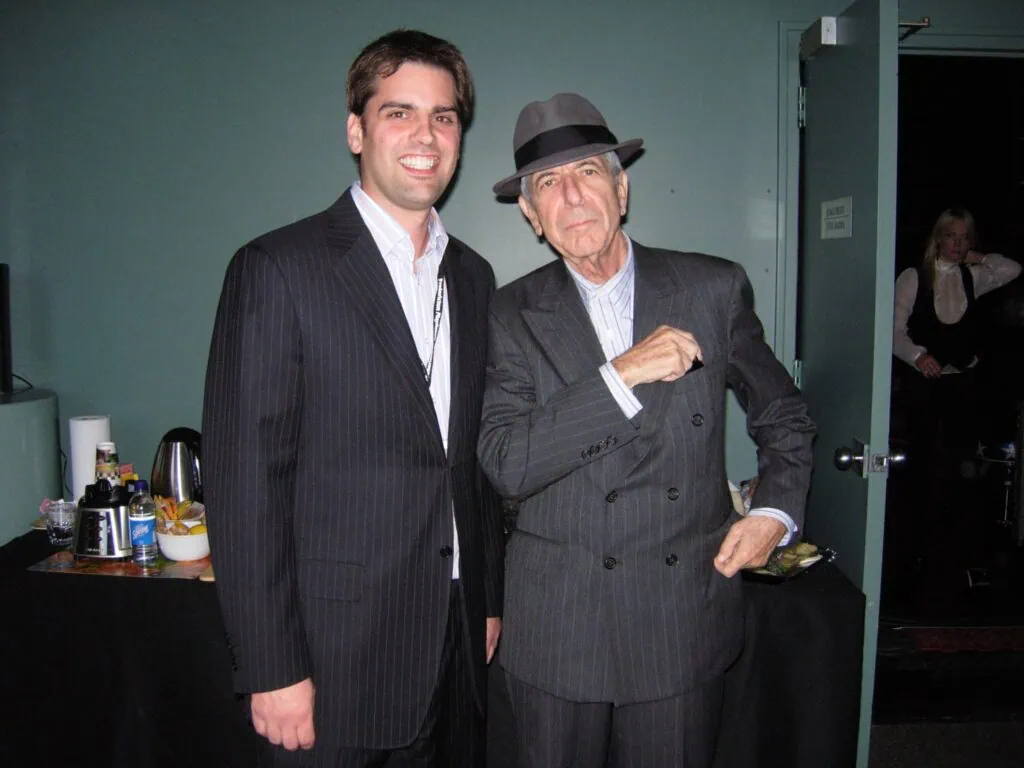
“Just before the show, the house was in, it was like, 15 minutes to curtain, and I had a poster that I wanted him to sign,” says Yerxa. “I went back to the Green Room, and he was there, just me, Leonard, and his daughter, Lorca. I was talking to him, asking how the week was, and he said, ‘Everything’s been great,’ and I told him how the community was so excited, and thanked him for doing the show. And I said, ‘How are you feeling about the show?’ And he said, ‘To be honest with you, I’m really, really nervous.’ I said, ‘You’ve got nothing to be nervous about. All of these people who are coming tonight, it doesn’t matter what you do on stage tonight, there’s a love here.'”
Yerxa was right. When Cohen took the stage, the audience members rose as one and gave the beaming musician a lengthy standing ovation before the band even played a note. He finally had to coax the crowd to take their seats to start the concert.
“I have never had that kind of experience in an audience before,” says Yerxa, who watched from the front row of the balcony. “When he walked out on stage, and everyone leapt to their feet, I described it as a religious experience. There was a feeling in the audience. It was something profound, like I haven’t experienced since. It was just a deep love and appreciation.”
A standing ovation might not seem that much of a surprise now, given the late poet’s iconic status worldwide. But in 2008, Cohen didn’t know how he’d be received after being away from the stage for so long. It was exactly the start Cohen and his group needed.
“The nerves that everybody might have had when we first walked out dissipated pretty quickly due to that standing ovation and the great reception we received,” says Roscoe Beck, Cohen’s bandleader and bassist. “Yeah, at the end of the show, everybody felt great.”
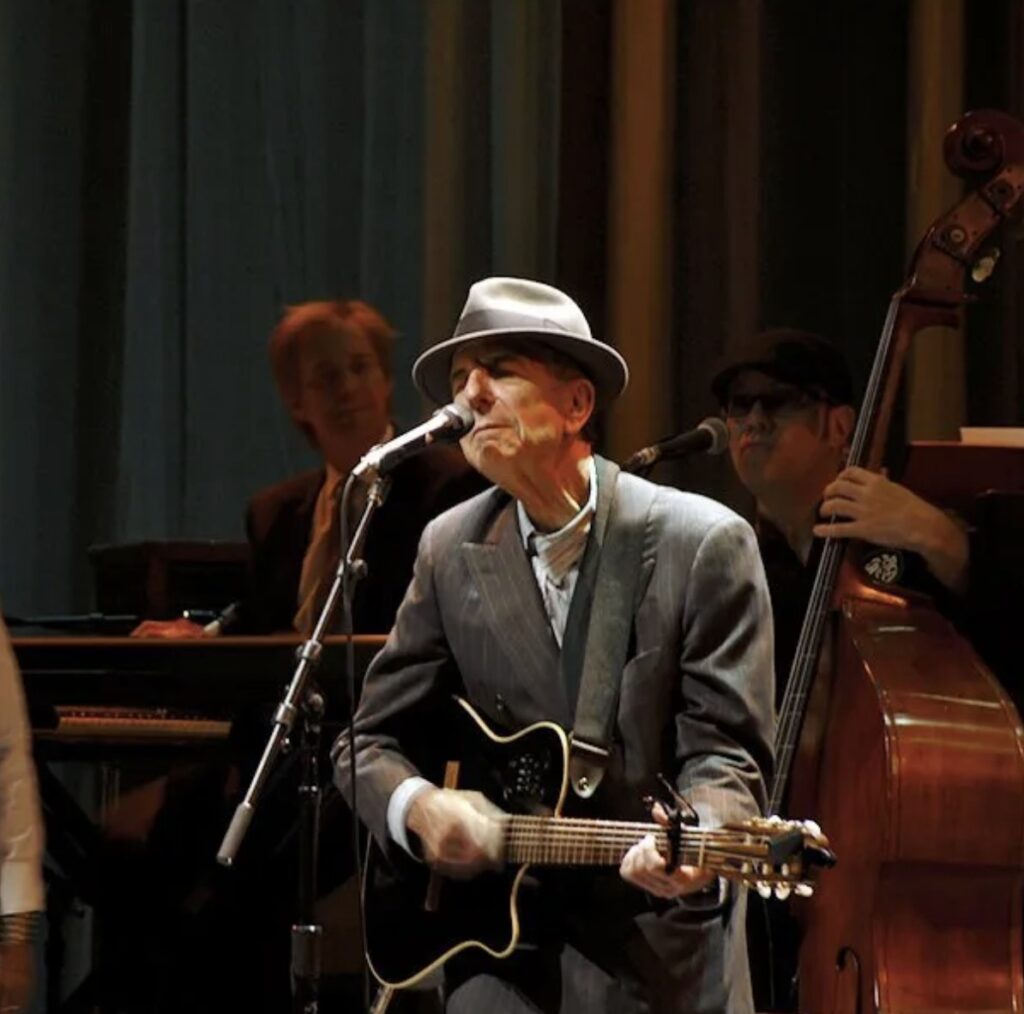
Beck, like Cohen, had thought they were done touring together. Beck first went on the road with Cohen in 1979, had worked on his recordings, co-produced the landmark 1986 Jennifer Warnes album of Cohen songs, Famous Blue Raincoat, and had put together Cohen’s last touring band from 1988 to 1993. Out of the blue, he got an email in 2006, with Cohen writing that he needed to talk to him about something.
“Within a couple of days, I got another email and he said, ‘Oh, I jumped the gun on this, I’m not quite ready yet,’” says Beck. “Almost exactly a year later, in 2007, I got almost the same email, ‘What are you doing? I’d like to talk to you.’ He said, ‘Okay, I’m going to fly down to Austin.’ He and Lorca flew down. He laid it all out for me. He said he’d been made an offer he couldn’t possibly refuse. He said (tour promoters) AEG wanted to put him on the road, that money was no object, which was an odd thing to hear, and would I put a band together for him again.”
What changed Cohen’s mind was the devastating loss of his life’s savings, some $9 million siphoned from his accounts by his former business manager. The only way to replace that kind of money was a return to the stage, but Cohen had to be convinced.
“Leonard said that his deal with AEG was that if he wasn’t satisfied with the way things were going in the first six weeks, whether with the band or the concerts or promotion or anything, he could pull the plug on the whole thing, just cancel it,” says Beck. “And that was always out there. He had told AEG at our initial meeting with them in 2007, ‘I’ll do this tour if you can arrange a tour for a 75-year-old man.’ He didn’t want travel days to be concert days, if at all possible. So the schedule was very comfortable. We travelled with our own sound system, our own caterer, everything was in-house and travelled with us. We had wardrobe people who got our suits dry cleaned and brushed our hats, absolutely everything was taken care of. It was a very well-oiled, smooth machine.”
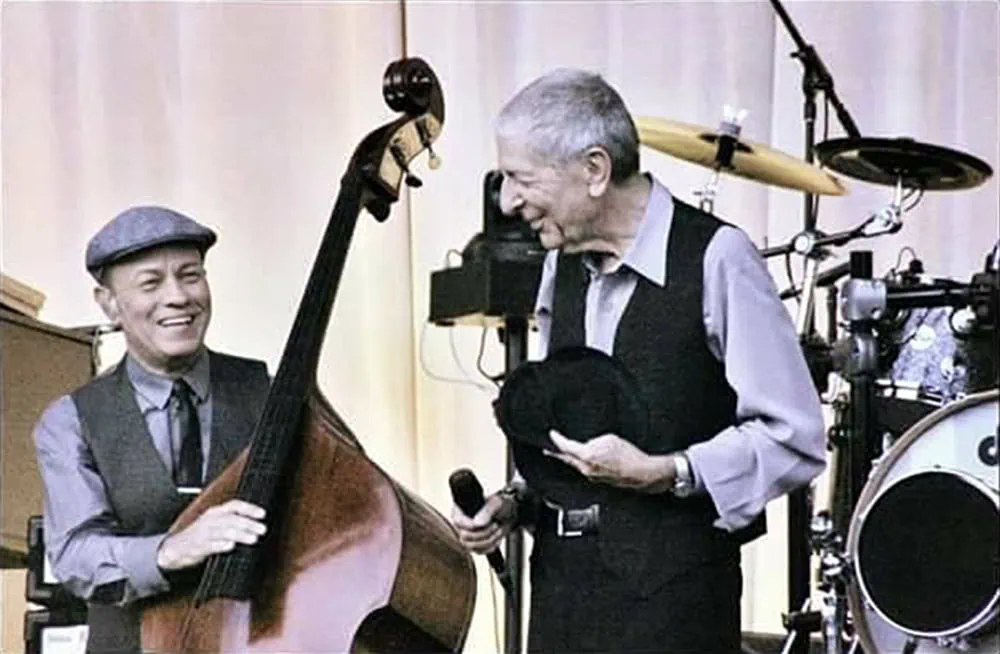
Given all the money that was on the line and the incredible interest in seeing Cohen on stage again, how did tiny Fredericton get the honour of the first show?
“We intentionally started small,” says Beck. “That was Leonard’s idea. He wanted to start smaller and build from there. That’s exactly what happened, to the surprise of many of us. We went from 700 seats to 3,000 seats, and before long, 3,000 seats to 15,000 seats. The success of the tour was a surprise to everybody, I think, even Leonard. I don’t think anyone anticipated what the reaction would be, how many people wanted to see him after all those years. It was a delightful surprise.”
It was certainly a surprise for Fredericton.
“I got a call from (promoter) Ruben Fogel,” says Yerxa. “He called me to hold the dates for the show, told me what it was, and he said that he was working in partnership with AEG to do some shows in the Maritimes, and they would be the first shows of the tour. Come to find out, they wanted to do some small venues to test-run the show. Then Reuben said, ‘We need a few because you’re going to be the first show, and they want some rehearsal time and some production time.’ So, they ended up booking five days in the theatre.”
It was exciting news, but it also meant the pressure was on for the theatre.
“The next crazy thing that happened was when we put the show on sale,” says Yerxa. “At that time, people still lined up for tickets at the box office. We did do online ticketing, but it was fairly new for us; the systems weren’t as advanced as they are today. We did a pre-sale for our donors; they took a few tickets, and then we split the house, some would be available only in person, some by phone, and some online. We would say the only way to guarantee tickets is if you’re in a physical lineup. So we had people camp out overnight, just like the old days, people camped out on the front steps for the sale that morning. There were maybe a hundred. It was the last time I can remember people camping out, coming the night before with a sleeping bag.”
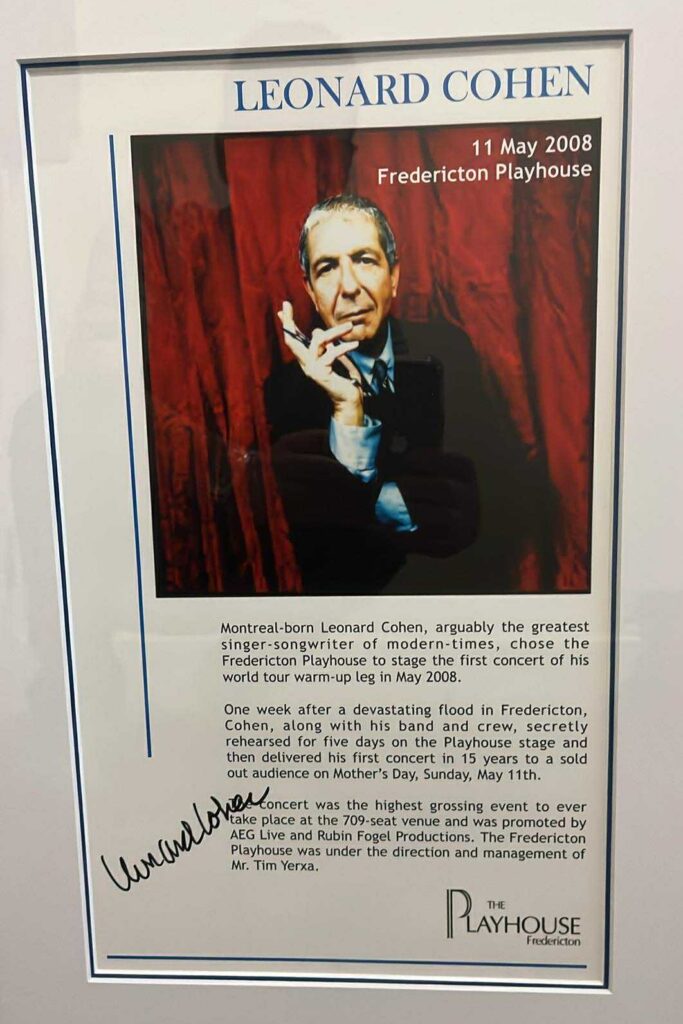
“We got inquiries from all over the world. People were coming from Europe, calling from Sweden, and there was a ton of pressure on us. We put it on sale, the website crashed, and it sold out in a matter of minutes. And then I personally had to deal with the local community aftermath of all the important people in town who didn’t get tickets. I had some very painful conversations with some very important people. The pressure for tickets was unbelievable. I went through that for weeks. And lots of bribes. Lots and lots of bribes.”
It was fantastic exposure for the theatre. “It was funny because AEG didn’t want a lot of attention on these shows. They wanted the show to have its big premiere in, I think, Toronto. They didn’t want the international media attention on Leonard Cohen’s big comeback tour to be on Fredericton, New Brunswick. But the news was out, so we were showing up in every publication you can imagine.”
The other pressure on Yerxa was to keep people away from the theatre the week before. The promoters had booked the theatre to assemble the technical and stage elements and give Cohen and the band some rehearsal time on stage. “Trying to keep it secret that that rehearsal was going on for five days was nearly impossible,” says Yerxa. “Anyone who walked by the Playhouse could see that there were trucks in the loading dock, and people coming and going constantly. So they knew what was going on, but we weren’t allowed to talk about it. The media would call, and we’d have nothing to say, other than the show was on Sunday.”
In the small city, Cohen sightings ran rampant, from restaurants to hotels to strolls along the river. But Cohen had chosen his return wisely. With classic Maritime charm, people left him alone, honoured that he was there in the community.
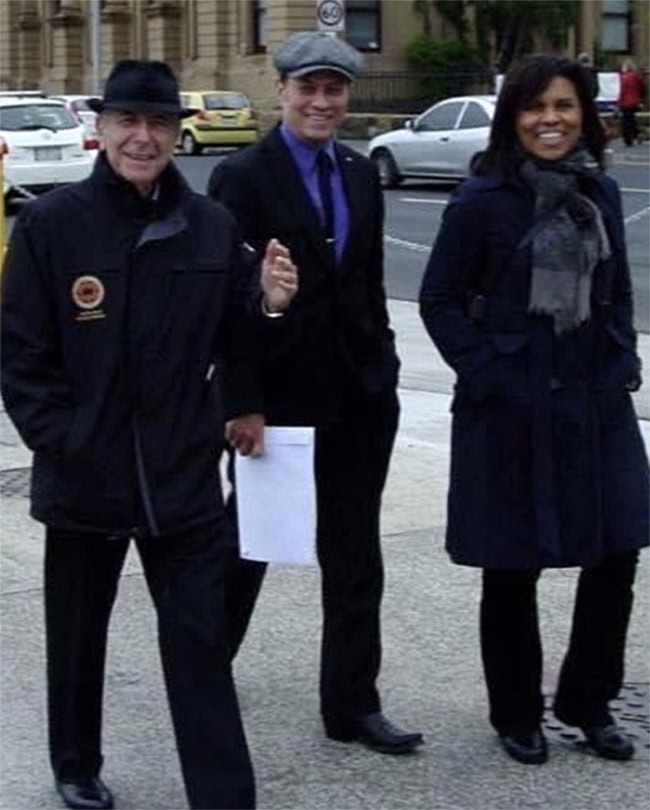
Fredericton got great marks from Cohen and the band.
“It was a wonderful first concert,” says Beck. “The reception was just wonderful. It was a great kick-off. I don’t think I’ve done any other tour in my life that I enjoyed as much. And I’m pretty sure most of the members of the band would agree with that. I’m still in constant communication with the Webb Sisters, because Hattie and I made a record together. We still talk about the tour, how much fun it was, how inspiring Leonard was, and what a great success it was. I still think about it every day.”
“The concert’s become one of the legendary concerts that ever took place in Fredericton,” says Yerxa. “At the time, for us, it was a really big deal; it was the highest-grossing show that we’d ever done. It was pretty exciting.”
That sentiment was echoed for all 709 people in the audience that night, and it was also a milestone moment for the legend himself.
“This is the first time I’ve done this in 14 years,” said Cohen from the stage at the Fredericton Playhouse that night. “I was 60 years old the last time — just a kid with a crazy dream.”
